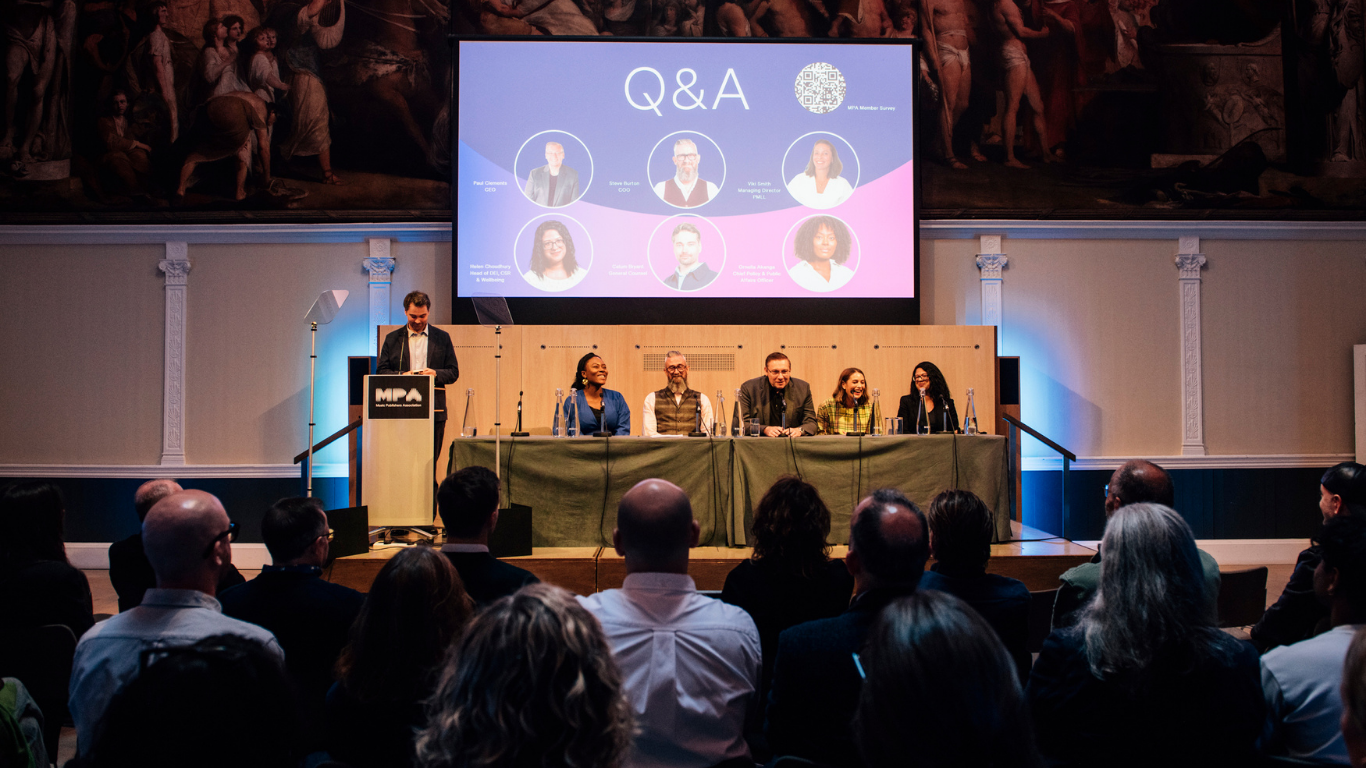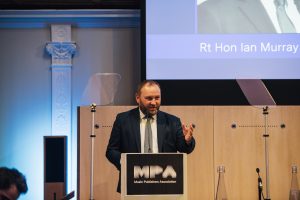MPA Annual General Meeting Roundup and Rt Hon Ian Murray’s speech

Date
Thank you to all the MPA Members who attended our Annual General Meeting on 25 September at the RSA House in London. The afternoon’s highlights included:
✔️Speech from CEO Paul Clements covering the latest updates from the MPA’s subsidiaries MCPS and PMLL, inclusive of significant growth projections, changes in broadcast licensing and future service provisions, as well as AI remaining a key focus for the organisation.
✔️ Address from the MPA’s Chair, Paulette Long OBE, on the MPA’s work with the government in relation to music streaming alongside the Department for Culture, Media and Sport, the Metadata workstream with Intellectual Property Office UK, and the Creator Earnings Working Group with Competition and Markets Authority.
✔️Insights from Alex Sobel MP on the Labour Party (UK)‘s commitment to support rightsholders in this rapidly developing AI market.
✔️The first music industry address from the newly appointed Minister of the Creative Industries, Rt Hon Ian Murray MP.
✔️Re-appointment of MPA board members: Natalie Kassner at Kassner Music, Richard King at Faber Music, Jonathan Tester at Bucks Music Group and Pascale Khalaf at ABKCO Music & Records, Inc.
We were very pleased to welcome our members for an inspiring afternoon, and to see so many of them at our evening networking drinks, kindly sponsored by Musixmatch.
A huge thank you to all our members from the entire MPA team. We will continue to proudly represent your rights and champion our sector over the next year.

Below is a transcript of the speech given by Rt Hon Ian Murray MP, Minister for Creative Industries, Media and Arts:
“Thank you for the invitation to join you this afternoon at your annual general meeting. I’m delighted to be here. This is my first music engagement since stepping into post, and I can’t think of a better audience to play to. As a minister for both DCMS and DSIT, I believe firmly in the shared importance of creativity and innovation. My role is to listen to the needs of our leading sectors and keep in tune with the opportunities and challenges facing them.
The UK has always been a nation of storytellers, artists, and innovators. Today, our creative industries prove that creativity isn’t just inspiring – it’s profitable, sustainable, and at the heart of our future economy. That’s why the Creative Industries are one of the government’s priority sectors. And it’s why our Creative Industries Sector Plan, published in June, lays out a clear vision for how we’ll back these cutting-edge sectors, including music, over the coming decade.
It charts a path to open up access to finance, to drive forward innovation and growth, to grow trade and exports, and to unlock the full strength of creative clusters right across the UK .I recognise music’s place as a vital creative industry – the very lifeblood of our nation. And for the government, we want to make sure the sector has the support you need to keep shaping powerful and influential stories.
Over the years, the UK has produced global superstars whose work has struck a chord far beyond our shores – from Adele to Lewis Capaldi, whose success has helped our country secure its position as a top exporter of music.
On taking up this brilliant role, my officials asked me what music I liked. I said that while I recognise the Proclaimers as a valuable cultural export, my own tastes tend to be a little broader. And so it is wonderful to be here to celebrate the breadth of our music industry. Because behind every chart hit is a whole orchestra of effort. Music publishers play a vital role in this ecosystem, providing a crucial link between music creators and artists and ensuring our country’s music reaches audiences UK and worldwide.
Looking to the future, I know you will agree that sustainable growth is essential if we want to keep hitting the high notes. I want to ensure all parts of the music industry are able to thrive and continue the UK’s success story.
That’s why we’ve committed to a Music Growth Package that will see government funding for the sector more than doubled up to £10 million a year for the next three years, with a focus on supporting the growth of the grassroots sector as well as helping UK artists break through on a domestic and international stage. This package will support emerging UK artists and music professionals, strengthen grassroots infrastructure and boost exports, breaking down barriers to success at home and abroad. I look forward to setting out more detail on this new support in the coming months.
We are also aware that the success of our world-leading music industry relies on music creators, including songwriters, receiving their fair share of the rewards, especially in the era of streaming. That is why this department convened the music industry through the Creator Remuneration Working Group over the past year to address concerns over low creator earnings.
We expect that work to deliver real benefits for UK creators, both through the principles created by the British Phonographic Industry, as well as individual commitments made by major labels, as well as enhancing the growth of the sector.
I would like to thank the MPA for their engagement in this vital work – I understand it is an impossible task getting the music sector to read from the same hymn sheet, but significant progress was made. We stand at a pivotal moment for the music industry, with major changes in markets, audiences and technology. And I want to touch on AI in particular, which is opening up extraordinary opportunities for innovation, discovery and growth.
But with opportunity comes challenges, and it is our responsibility to ensure that AI develops in a way that supports, not undermines, human creativity. You will have heard this before, but I want to reiterate – this government is absolutely committed to our creators and rights holders, and to supporting them – supporting you – to control and license your work in the digital age.
DCMS and DSIT secretaries of state have held three roundtables with the creative and AI sectors, and we are convening expert and parliamentary working groups to consider the options ahead. Our goal is clear: a copyright regime that values and protects human creativity, that can be trusted, and that unlocks new opportunities for innovation across the creative sector and wider economy.
This is how we ensure that music – and all creative expression – continues to inspire, enrich, and shape our cultural and economic future.We have much more to discuss, and I look forward to spending much more time with you all in the weeks and months ahead. So once again I would like to thank the MPA for inviting me here today. Enjoy the rest of your evenings.”
Share article